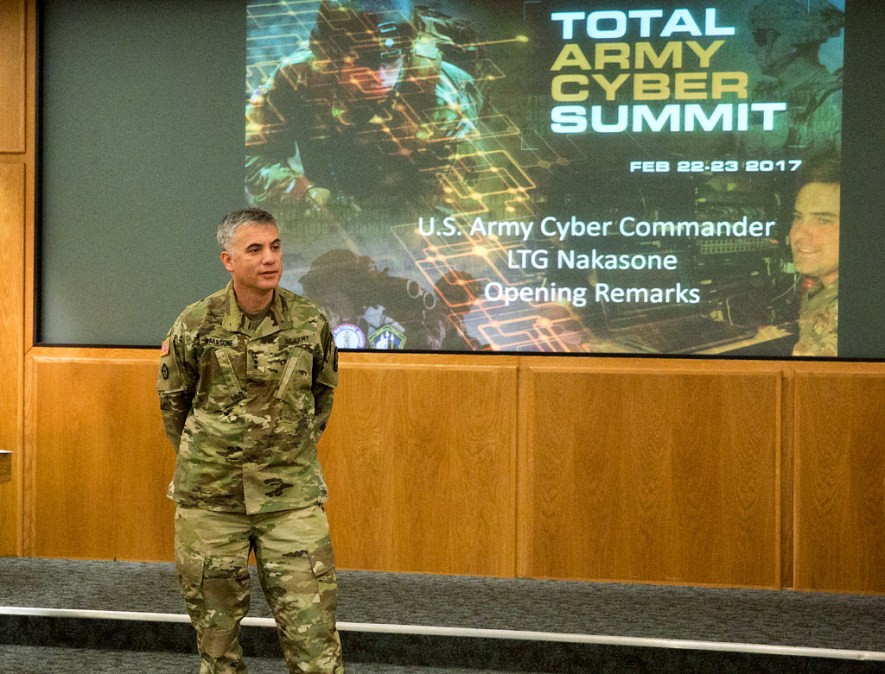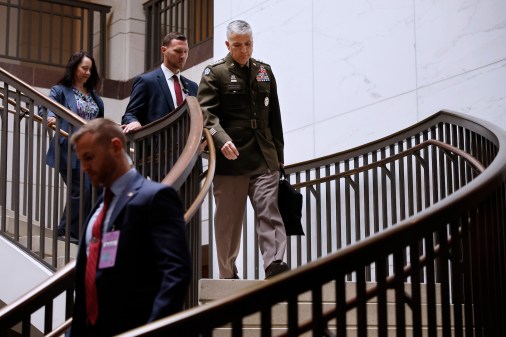U.S. cyberwarriors are getting better at fighting ISIS online, says top general

The U.S. military has gotten better at countering ISIS’s digital operations over the last six months, according to Lt. Gen. Paul Nakasone, the head of Army Cyber Command.
“I think what we are learning is in terms of being able to counter a message, being able to attack a brand — in this case the brand of ISIS — and then, the other thing is, how do we do this with the speed and accuracy that is able to get at an adversary that six months ago was moving uncontested in cyberspace,” Nakasone said during a Senate Armed Services subcommittee hearing. “I think we’ve learned those things over the last six months. I think we as a department have done much better.”
ISIS shares propaganda, communicates with allies and spreads other messaging via the internet. In the past, the group’s successful use of social media has been linked to terrorist attacks in the U.S., including the shootings in San Bernardino, California and Orlando, Florida.
Nakasone’s comments come just three weeks after the Washington Post reported that the offensive cyber mission against ISIS at one time sparked a fierce debate inside the U.S. government, garnering some criticism from several U.S. intelligence officials.
Codenamed Operation Glowing Symphony, the operation reportedly began in November with the goal of disrupting ISIS’s online presence by obtaining account passwords, deleting content and sabotaging existing online campaigns. But before ever being launched, the mission reportedly concerned top Obama officials, including former Secretary of State John Kerry, because the operation involved military personnel manipulating computer servers located in allied countries. In the end, a total of 15 countries were notified of the secretive mission, according to the Washington Post.
Little is publicly known about how the military uses offensive cyber tools against terrorist groups like ISIS, an effort which former Defense Secretary Ash Carter once described as “dropping cyber bombs.”
“It took a little while, but they learned so much in the first few months of doing it that it set the stage for things that are happening now, and I would say for operations in the future,” an unnamed senior U.S. defense official told the Washington Post in reference to Glowing Symphony.
Joint Task Force Ares, a unit created under Nakasone’s predecessor Lt. Gen. Edward Cardon, is coordinating the complex mission.
“Quite simply, ISIS is no longer uncontested in cyberspace, and that’s a change,” said Charlie Stadtlander, a spokesman for U.S. Army Cyber Command. “[Joint Task Force Ares] has demonstrated the value to the Joint Force that cyber can be a meaningful contribution to an overall military mission.”
U.S. officials often decline to discuss specifics regarding any of the military’s offensive cyber capabilities because disclosing such information may enable an adversary to proactively design appropriate defenses.
“Unlike the other domains, in the cyber domain there’s a lot steeper learning curve for adversaries to gain capabilities. It takes a long time to build an army, it takes a long time to build an air force, it takes about six months or less to hire some contractors and get capable as a cyber adversary in this domain,” said Vice Admiral Marshall B. Lytle, Cyber and Chief Information Officer for the Joint Staff, who also spoke at Tuesday’s hearing. “We need to be on our game, we need to look at ways to up the U.S.’ game and DOD’s game in cyber defense.”
The question of who in government is best suited to counter information operations remains an open question on Capitol Hill, where lawmakers have considered an answer in recent months after asking for feedback from private sector experts.
NSA Director and U.S. Cyber Command head Adm. Michael Rogers said during a hearing earlier this month that U.S. Cyber Command is not currently “optimized” to combat information operations orchestrated by foreign powers.
“It right now is not in our defined set of responsibilities per say,” Rogers told lawmakers. “I would be the first to admit that [information warfare] is not what our workforce is optimized for … we are certainly not where we need to be.”
Significant offensive cyber operations levied by the Defense Department sometimes require top down approval from the White House.
When asked by Sen. Bill Nelson, D-Fla., what the U.S. military can do to “make Putin feel enough pain to cease his aggression in cyberspace,” Lytle explained that it starts with a strong defense at home across the government and it can also include deploying offensive capabilities when approved by the President.
“There is a whole offensive capability we can talk about in a classified environment that looks at activities, that looks at ways and sets up options for the President to take in case he wants to do something about things like this,” said Lytle. “[These are] capabilities that can be prepared to deny adversary access, to manage adversary systems, to cause havoc amongst adversary systems, there are a number of things you might be able to do within cyber, using cyber techniques, to cause kinetic effects on the other side of the wire.”





